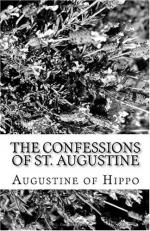
|
| Name: _________________________ | Period: ___________________ |
This test consists of 5 short answer questions, 10 short essay questions, and 1 (of 3) essay topics.
Short Answer Questions
1. Who writes Hortensius?
2. Why does Augustine want to move to Rome?
3. Why does Augustine read books of rhetoric?
4. Where does Augustine go to study?
5. What is Augustine's native language?
Short Essay Questions
1. What gives Augustine an excuse to continue following his baser desires?
2. Why did one of Augustine's friends abandon Christianity and what happens after that?
3. Augustine says he wrote Confessions for what reason?
4. What do the Manicheans believe about food?
5. What does Augustine say about his "sins" as a schoolboy and his teachers reaction to them?
6. What happens with Augustine and the Manicheans and why?
7. What is Augustine's primary thoughts of when he arrives in Carthage and what does he do with them?
8. What is Augustine's thinking on marriage?
9. What does Augustine say is the difference between how the simple-minded and intellectuals read and understand the Scriptures?
10. What does Augustine decide about reading Scripture and interpreting it?
Essay Topics
Write an essay for ONE of the following topics:
Essay Topic 1
In book VII, Augustine rejects astrology after speaking to an old man Vindicianus, and also due to the arguments of his friend Nebridius. They both say that the predictions of astrologists are purely a matter of chance, plus taking into account a person's condition, wealth, and circumstances. Discuss one of the following ideas:
1. What do you think Augustine's Christian beliefs would say about the concept of astrology? Use examples from the text and your own knowledge.
2. Why do you think many people in those times believed in astrology? Do you think the people who believe in astrology today do so for the same reasons?
3. Do you think science has disproved the validity of astrology? Why or why not? Discuss thoroughly.
4. What do you think about the thoughts of Augustine's two friends who say that the predictions of astrologists are purely a matter of chance, plus taking into account a person's condition, wealth, and circumstances?
Essay Topic 2
In Book V, Monica has an irrational urge to keep Augustine with her and not let him go to Rome. This incident symbolizes the struggle that all human beings have to control their fleshly desires in favor of their love of God. Discuss the following ideas:
1. For Augustine, is spirituality incompatible with physical life/pleasure (e.g., eating, sex, art, etc.)? Does his ideas about this change over the course of the Confessions?
2. Why do you think Augustine would say that physical life exists if it is incompatible with spirituality?
3. According to Augustine, can someone be highly spiritual and still "indulge" in the pleasures of physical life? What do you think personally?
Essay Topic 3
Augustine urges the church faithful to be righteous and to do good deeds, but not as a substitute for their faith. Their faith must be shown by their good deeds, and at the same time these good deeds must reflect their faith. This statement is a paradox.
1. Why do you think this statement could be classified as a paradox?
2. What do you think Augustine means by the statement above?
|
This section contains 1,042 words (approx. 4 pages at 300 words per page) |

|




